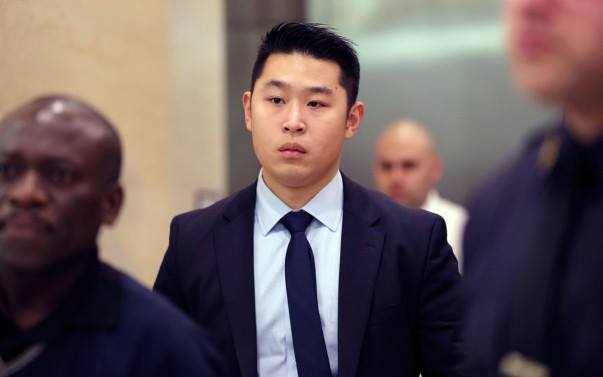Student Roundtable for Liang Convention
NYU Law held a roundtable discussion on NYPD officer Peter Liang’s conviction.
March 7, 2016
NYPD officer Peter Liang is facing up to 15 years in prison for second-degree manslaughter — a sentence and conviction which has led to tens of thousands Chinese-Americans in New York City to rise up in protest.
Liang was convicted on Feb. 11 of manslaughter in the killing of an unarmed black man named Akai Gurley. On Friday, NYU Law held a roundtable discussion concerning what Officer Liang’s conviction means in terms of the broader issue of police brutality, and why Asian-Americans might be divided on the judiciability of this case.
Vice President of the NYU Chinese Student Society Jeremy Cheung, who is a sophomore in the joint CAS and Wagner public policy program, said he sees the difference in how Asian-American officers and white officers may be treated as evidence of systemic injustice, rather than the conviction of Liang itself being unjust.
“I believe that Darren Wilson — the [officer] who shot Michael Brown — should be charged and incriminated as well as all other white police officers accused of police brutality,” Cheung said. “Since this did not happen, I see [the conviction of Peter Liang] as an example of covert racism towards Asian- Americans.”
However, Cheung added that this does not absolve Liang of his crimes, calling him a criminal who should be sanctioned just like every other officer.
CAS sophomore and secretary of the Asian-American Woman Alliance Amanda Tiew said the recent outcry by Asian-Americans in favor of dropping charges against Liang has been very disappointing.
“By demanding ‘justice for Peter Liang’ we effectively demand the same white privilege that has been unfairly afforded, time and time again, to officers like Darren Wilson and Timothy Loehmann,” Tiew said. “The Asian-American community should realize that we as people of color are inevitably disadvantaged by the same white supremacist system and over-militarized police force that operate in this country.”
Sarah Hsu, a second-year law student and co-chair of Asian-Pacific American Law Students Association, commented on how the diversity within the Asian-American demographic results in a splintering of views on cases such as Liang’s.
“I think it goes to show that we get so few opportunities to see such great rallies, so that [the rallies are] sort of heartening because it’s kind of great to see that Asian-Americans can be passionate about social-political issues — [to see that] the power is there,” Hsu said. “I think that could be pushed for more productive, constructive uses, like this dialogue.”
A version of this story appeared in the Monday, March 7 print issue. Email Rebecca Oh at [email protected].
























































































































































